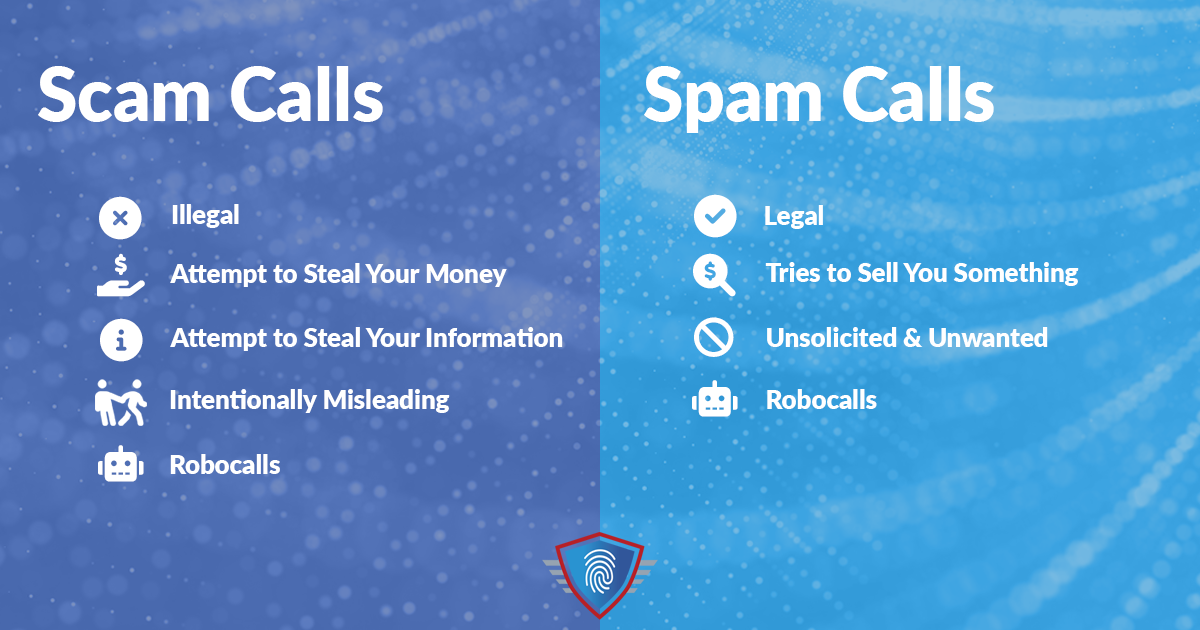
Do you know the difference between a scam call and a spam call?
Scam calls are nothing new, but like other criminal activities, they are becoming more sophisticated, which means that we must know what to look for and what actions we can take to protect ourselves. Phone scams are meant to trick you into giving your money and personal information away. Beware! They may even convince you that you’ve won some sort of sweepstakes or contest that you’ve never entered.
Spam calls, on the other hand, are (and most people agree) aggravating. They are unsolicited marketing messages sent to thousands of people in hopes of selling you something, eliciting donations, conducting surveys, and promoting whatever it is that they want you to know about or act upon, like political pre-recorded messages.
In 2021, the FTC received 5,009,560 Do Not Call complaints¹ with the Top 5 Complaint Categories being:
- Imposters
- Warranties & protection plans
- Reducing debt
- Medical & prescriptions
- Computer & technical support

Why do I get Spam Calls?
The bad news is that telemarketing is legal. In many cases, third party data providers are the telemarketer’s source for contact lists. While there are many ways that your phone number can be collected by third parties, here are some common ways to be aware of ²:
- When You Call 800 or 900 numbers
- When calling these numbers, a system called ANI (Automatic Number Identification) has permission by the Federal Communications Commission to add your number to their databases.
- Making Charitable Donations
- Charitable organizations may sell your information to telemarketing companies to help bring in more charitable donations by phone campaigns. They may also sell your information for additional income.
- Participating in Contests & Sweepstakes
- Oftentimes, the tradeoff for entering in contests and sweepstakes may not be worth it. Always read the Terms of Service before entering to win, because you may be entering in to lose more than you bargained for.
- Your Mobile Carrier
- Mobile carriers like AT&T, Verizon, Spring, and T-Mobile have sold data to third-party data aggregators.
Why do I get Scam Calls?
Scam calls are an indicator that your phone number has made its way into the wrong hands. How do scammers get access to your phone number in the first place?
- Data breaches
- While we hope that companies that have earned our trust take care of our personal information, we see headlines showing that corporations suffered from data breaches consistently. Many companies do intend to keep your information safe, but it’s best practice to know their safety practices before offering over your personal information.
- Dark Web
- The Dark Web is legal, although it houses a lot of illegal activity, such as selling/auctioning off other people’s personal information. If a fraudster gets your information from a data breach, personal documentation, or even through the web (such as social media, search engines, etc.), they can use that information and sell it for profit on the Dark Web.
- Personal Documents
- Personal mail holds a lot more information than a lot of us realize, including our first and last name, phone number, account number, home address, and email address. Thinking about just tossing your mail away once you’re done? Think again. Fraudsters will look through trashed mail to glean compromising information.
What can I do?
Taking the following steps should help lessen the amount of spam calls and scam calls that you receive, however eliminating them altogether is unlikely.
- Register your number on the National Do Not Call Registry to block telemarketing calls
- There are two ways to register your number with the National Do Not Call List
- Call 1-888-382-1222 from the phone number you wish to register
- Alternatively, you can register online at donotcall.gov. Registering this way requires you to verify by email within 72-hours of registration, otherwise, the registration will not be completed.
- Note: After 30 days on the DNC list, you should report any additional numbers that are continuing to call to the Do Not Call Registry. Violators can be fined thousands of dollars if they continue to call when your number is listed on the DNC registry.
- There are two ways to register your number with the National Do Not Call List
- Check to see which Call Blocking and Labeling solutions your phone service provider may offer by reviewing the FCC’s “Call Blocking Tools and Resources” page.
- Do not answer calls or respond to texts from numbers that you do not know, even if they are local numbers.
- If you do choose to answer unknown numbers, be cautious and do not:
- Offer or provide any personal information, including your name
- Answer “Yes” or “No”. We know, it sounds silly, but if they are on a recorded line, they can use your recorded responses to impersonate you with other vendors.
- If you do choose to answer unknown numbers, be cautious and do not:
- Do not give out personal information over the phone to someone that you do not know.
- Do not click on links in text messages from unknown senders. This is considered smishing, a form of phishing through text messaging.
- Sign up for IDSeal’s full-spectrum identity theft protection service.
- This service includes Digital Spy Dark Web Monitoring, where you can add up to ten phone numbers for monitoring. This service will alert you if any of your monitored numbers are found on the Dark Web, then provide you with the steps to take to help secure your information.
- If you are already a subscriber, be sure that you have added any phone numbers that you want monitored. Login Member Portal
- If you are not a subscriber and would like to be, visit our Protection & Plans page to learn about all of the features available to you as a subscriber.
- This service includes Digital Spy Dark Web Monitoring, where you can add up to ten phone numbers for monitoring. This service will alert you if any of your monitored numbers are found on the Dark Web, then provide you with the steps to take to help secure your information.
¹ https://public.tableau.com/app/profile/federal.trade.commission/viz/DoNotCall/Infographic
² https://www.getkeepsafe.com/blog/eight-ways-robocallers-get-your-phone-number/
Start protecting your identity today! Signing up is quick & easy
Remember, 1-in-4 Americans are the victim of identity theft. It's not a matter
of if you'll become a victim, it's when...